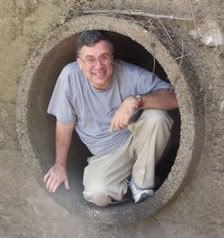Ruby Jewsday
WALTER RUBY’S RIFFS ON RUSSIAN JEWS, ISRAELIS AND PALESTINIANS, AMERICAN POLITICS, THE MEANING OF LIFE AND WHATEVER ELSE IS ON MY MIND.
Thursday, October 04, 2007
Jewish-Russian tensions in the Russian-speaking community
Click here to read my just-published piece in the Jewish Week on growing tensions between Jews and non-Jews in the New York Russian-speaking community. After you read it, click on 'continued' to read some more of my thoughts.I woke up in the middle of the night last night in a cold sweat concerned that my just published piece will contribute to escalating tensions between Jews and Russians in the community. Dont get me wrong; I think that the anti-Semitism (as well as the anti-Russian feeling from the Jewish side)described here is a real problem and the community needs to talk about it openly and look for solutions before it worsens. But, as always in life, there are many shades of gray. Most Jews and Russians live side by side peacefully and many are friends and lovers and business partners, etc., etc, and is it right for me as a journalist to stress the negative and possibly contribute to a strain in those relationships? Nor do I want to contribute to Jewish paranoia and fear of the 'Other', an impulse I have spent much of my career fighting, especially as it relates to Israelis and Palestinians.
So I read the piece over several times and decided it was basically fair and on-target except I wish I had kept one quote Alec Brook-Krasny made at the community meeting, which ended up getting cut from the final version. (Unfortunately, I am always under pressure to shorten my Jewish Week pieces and have to cut a lot of good material). Alec said that Jews and Russians "have a lot in common, including having being born in the Soviet Union and having all been afraid to express our real opinions…Here though there is free speech and we need to dialogue with each other and learn the fundamentals of conflict resolution. We need to emphasize our common interests and to resolve differences through political means, because if we don’t use politics, there will be war.”
Of course, he is right. There is still a lot more that holds the community together than what drives it apart and those things shouldn't be forgotten. But extensive dialogue needs to happen as the Russian-speaking community sorts out its identity. While it is sad and confusing for many to see the community's once-obvious Jewish character being worn away by a variety of factors, especially the rapid influx of non-Jews, who now may make up 40 percent or more of the community, not to mention the influx of Moscow-based TV, film, newspapers etc, the hard fact of the matter is that the change is irreversible. So the question is 'How does the community leadership manage the transition from Jewish community to Russian-speaking community in a sensible way that leaves people of all backgrounds, Kews, Russians, Ukrainians, Azeris, Armenians, Uzbeks, Tatars et al) feeling safe and open to each other. Can the old hatreds and fears on both sides be put aside and a new, bright and happy Jewish-Russian fusion be created? And how to do that at a time when Moscow, which seeks to influence the community is in the hands of an authoritarian and arrogant KGBnik flush with oil billions, who despises democracy, winks at murder of political opponents and encourages the worst elements of Russian civilization--great Russian chauvinism and silnaya ruka? These are important questions, and its good that they are now out on the table and no longer swept under the rug. It wont be easy or comfortable to talk about these things and there is potential for people becoming angry and insulted. As Brook-Krasny says, lets hope the people leading these discussions know a thing or two about conflict resolution and 'win-win' negotions. Nu, does anybody out there have opinions on all of this?"
Continued...

